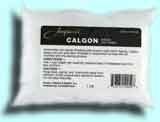

Using distilled water is an unnecessary expense, however. The easiest solution is to simply buy a phosphate-containing water softener. This water softener, known as Calgon-T or Metaphos, is a powder composed of the chemical sodium hexametaphosphate. Most dye suppliers can sell you this water softener. (See Sources for Dyeing Supplies). Calgon brand laundry water softener may be substituted only if it is not phosphate-free; the old form of Calgon, also known as Calgon T, was sodium hexametaphosphate, which is ideal, but the phosphate-free liquid version of Calgon, containing polycarboxylate, should not be used in dyeing. Jacquard's Calgon, Dharma's Water Softener, and ProChem's Metaphos are all fine, or you can look specifically for the name sodium hexametaphosphate.
If you have very hard water, you should add water softener to your washing machine when washing out excess fiber reactive dye, as well. Hard water can interfere with dye wash-off.
Household water softener systems replace the minerals in the water with salt, sodium chloride. It should be fine for dyeing. The amount of salt added to your hot water by your water softener is typically too small for there to be any need to take it into account in adjusting recipes. See the manual for your water softener for more information, or call its manufacturer. Alternatively, just use your cold water - usually only the hot water supply is softened - and then use one of the phosphate water softeners mentioned above, as needed.
Areas with "bad" water often have coin-operated water purifying machines available outside of grocery stores, which allow you to fill your own containers with water. This water is usually municipal water which has had the offending substances removed by reverse osmosis or filtrations. It should work just fine for dyeing purposes, but chemical water softeners are easier and probably cheaper.
Spring water often has minerals in it, so it is not a good choice for dyeing. Rainwater is very soft and is ideal.
Advertisements
 Back to list of FAQs
Back to list of FAQs
All of the pages on this site are copyright ©1998‑2026 Paula E. Burch, Ph.D.
Page created: Sunday, August 15, 1999
Updated: June 8, 2007
Downloaded: Sunday, February 01, 2026